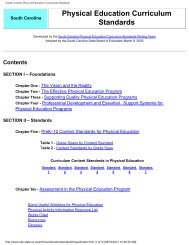SC GOVERNOR'S COUNCIL ON PHYSICAL FITNESS POSITION ...
SC GOVERNOR'S COUNCIL ON PHYSICAL FITNESS POSITION ...
SC GOVERNOR'S COUNCIL ON PHYSICAL FITNESS POSITION ...
Create successful ePaper yourself
Turn your PDF publications into a flip-book with our unique Google optimized e-Paper software.
<strong>SC</strong> GOVERNOR’S <strong>COUNCIL</strong> <strong>ON</strong> <strong>PHYSICAL</strong> <strong>FITNESS</strong>POSITI<strong>ON</strong> STATEMENT<strong>SC</strong>HOOL RECESSAll schools should offer convenient opportunities for students and staff toparticipate in enjoyable physical activity, and this imperative should beembodied in policy. Recess in elementary schools is particularly important.Recess, while separate and distinct from physical education, is an essentialcomponent of the total educational experience for elementary aged children.Recess should not be viewed as a reward to children or denied in order topunish children. The involvement of children in daily, unstructured physicalactivity during school hours is critical for their current and future health.RATI<strong>ON</strong>ALEVarious organizations including the National Association of Elementary SchoolPrincipals, the National Association for the Education of Young Children, and theAmerican Association for the Child’s Right to Play support recess as a vitalcomponent of a child’s physical and social development. Children need a variety ofmovement experiences to develop a healthy mind and body. In addition, inactivityand poor nutrition, which may begin in childhood, are considered major risk factorsfor many chronic diseases. Among 5 to 8 year-olds, for example, 40% havesignificant cardiovascular disease risk factors such as obesity, high blood pressure,high cholesterol, and an inactive lifestyle. 1 The National Association for Sport andPhysical Education recommends that children ages 6-11 participate in at least onehour and up to several hours of physical activity each day. 2,3 The activity may occurin periods of moderate to vigorous activity lasting 10-15 minutes or more. Recess isan opportunity for children to acquire some of the recommended daily activity time.In addition to contributing to physical health, recess also contributes to a child’sintellectual and cognitive needs. 1-3 As opposed to planned physical education,unstructured play allows children to decide for themselves how to spend their recesstime. As a result, children exercise their sense of wonder, which leads to exploration
and creativity. Children whose time is constantly structured may lose the ability to becreative and to entertain themselves. In addition, studies have found that studentswho do not participate in recess may have difficulty concentrating on specific tasks,are much more “fidgety” in the classroom, and are deprived from interacting with andlearning from their classmates. 1-3Recess may also provide the opportunity for students to develop and improve socialand emotional skills. 1-3 During recess periods, students learn to resolve conflicts,solve problems, negotiate, and interact cooperatively. In addition, recess serves as adevelopmentally appropriate strategy for reducing or lowering a child’s anxiety. 1-3Elementary school aged children have very few coping strategies, and recessprovides a healthy means to manage stress. Recess also provides opportunities forcultural exchange between children. During unstructured play, children from differentcultures can learn from one another in a non-threatening way. 1,3 Furthermore, recessprovides children an opportunity to enjoy playing with friends, and playing with friendsis one of the biggest reasons children enjoying going to school!In summary, recess is an essential component of the total educational experience forelementary aged children. It provides opportunities for unstructured physical activity,which helps students stay alert and attentive in class and provides other cognitiveand social benefits. Time should be allotted within every school day for elementaryschool aged children to enjoy supervised recess that is separate from physicaleducation. Recess should not be denied to children in order to discipline or punishthem. The involvement of children in daily, unstructured physical activity duringschool hours is critical for their current and future health.STATEMENT ADOPTED BY <strong>SC</strong> GOVERNOR’S <strong>COUNCIL</strong> <strong>ON</strong> <strong>PHYSICAL</strong><strong>FITNESS</strong>, {October 17, 2001}References1. The American Association for the Child’s Right to Play. The case forelementary school recess. www.ipausa.com. Viewed August 2001.2. National Association for Sport and Physical Education (2001). Recess inElementary Schools. Reston, Virginia3. National Association of State Boards of Education (2000). Fit, Healthy, andReady to Learn. Alexandria, Virginia




